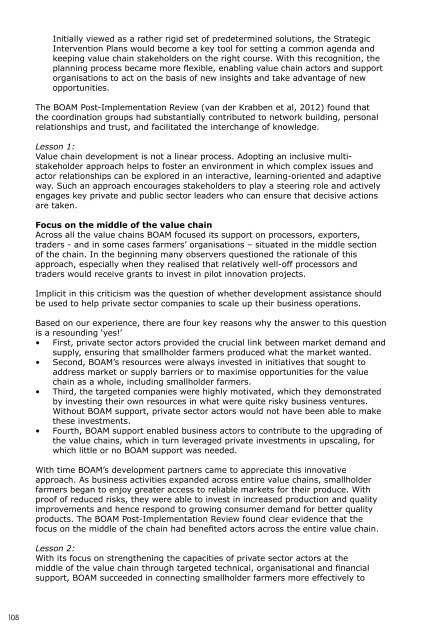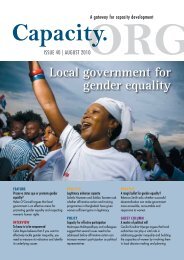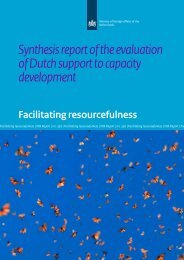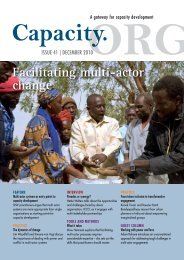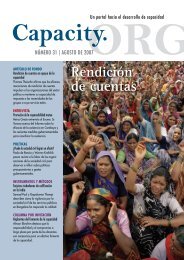Pro-Poor Value Chain Development - Capacity.org
Pro-Poor Value Chain Development - Capacity.org
Pro-Poor Value Chain Development - Capacity.org
Create successful ePaper yourself
Turn your PDF publications into a flip-book with our unique Google optimized e-Paper software.
108<br />
Initially viewed as a rather rigid set of predetermined solutions, the Strategic<br />
Intervention Plans would become a key tool for setting a common agenda and<br />
keeping value chain stakeholders on the right course. With this recognition, the<br />
planning process became more flexible, enabling value chain actors and support<br />
<strong>org</strong>anisations to act on the basis of new insights and take advantage of new<br />
opportunities.<br />
The BOAM Post-Implementation Review (van der Krabben et al, 2012) found that<br />
the coordination groups had substantially contributed to network building, personal<br />
relationships and trust, and facilitated the interchange of knowledge.<br />
Lesson 1:<br />
<strong>Value</strong> chain development is not a linear process. Adopting an inclusive multistakeholder<br />
approach helps to foster an environment in which complex issues and<br />
actor relationships can be explored in an interactive, learning-oriented and adaptive<br />
way. Such an approach encourages stakeholders to play a steering role and actively<br />
engages key private and public sector leaders who can ensure that decisive actions<br />
are taken.<br />
Focus on the middle of the value chain<br />
Across all the value chains BOAM focused its support on processors, exporters,<br />
traders - and in some cases farmers’ <strong>org</strong>anisations – situated in the middle section<br />
of the chain. In the beginning many observers questioned the rationale of this<br />
approach, especially when they realised that relatively well-off processors and<br />
traders would receive grants to invest in pilot innovation projects.<br />
Implicit in this criticism was the question of whether development assistance should<br />
be used to help private sector companies to scale up their business operations.<br />
Based on our experience, there are four key reasons why the answer to this question<br />
is a resounding ‘yes!’<br />
• First, private sector actors provided the crucial link between market demand and<br />
supply, ensuring that smallholder farmers produced what the market wanted.<br />
• Second, BOAM’s resources were always invested in initiatives that sought to<br />
address market or supply barriers or to maximise opportunities for the value<br />
chain as a whole, including smallholder farmers.<br />
• Third, the targeted companies were highly motivated, which they demonstrated<br />
by investing their own resources in what were quite risky business ventures.<br />
Without BOAM support, private sector actors would not have been able to make<br />
these investments.<br />
• Fourth, BOAM support enabled business actors to contribute to the upgrading of<br />
the value chains, which in turn leveraged private investments in upscaling, for<br />
which little or no BOAM support was needed.<br />
With time BOAM’s development partners came to appreciate this innovative<br />
approach. As business activities expanded across entire value chains, smallholder<br />
farmers began to enjoy greater access to reliable markets for their produce. With<br />
proof of reduced risks, they were able to invest in increased production and quality<br />
improvements and hence respond to growing consumer demand for better quality<br />
products. The BOAM Post-Implementation Review found clear evidence that the<br />
focus on the middle of the chain had benefited actors across the entire value chain.<br />
Lesson 2:<br />
With its focus on strengthening the capacities of private sector actors at the<br />
middle of the value chain through targeted technical, <strong>org</strong>anisational and financial<br />
support, BOAM succeeded in connecting smallholder farmers more effectively to


